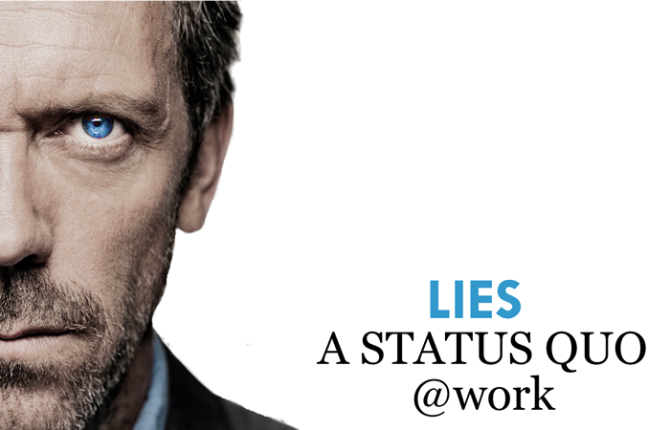Lies, Status Quo @ Work
Posted on February 18, 2015 by ThePMJournal
Why do people lie at work? There are several major situations in which people lie in employer-employee relationship or partnership: an employee is hiding the truth from the employer (about his actions or mistakes) for he wants to obtain several professional benefits or is afraid to lose his job, an employer is hiding the truth in front of an employee when the disclosure could harm people or property under its management, in partnership relations people tell partial truths, to keep the doors open if situation becomes unfavorable in a negociation. Everyone knows without honesty in labor relations there is no trust, if no trust there is no respect, if no respect you can’t build anything lasting.
So why people still continue to lie?
In real life, you will see the employers lie more than employees, probably because they feel more legitimate, while employer expects always from his employees to tell the truth. But honesty is bidirectional, so the lies: if you lie, your partner most certainly will lie or if your partner tell you the truth, you naturally feel to tell the truth. An employee often lies his boss, because he doesn’t have the courage to admit his mistakes in front of the employer (you can recognize these people very easily, because they pose in “perfect” employees, which are never wrong). A “perfect” employee is like a cock-and-bull… Everyone can be wrong, nobody is perfect. You know what it been said: Only those who does not work is not wrong. As an employee, assuming errors is essential, since demonstrates accountability and desire to grow. A great indian poet says: Close the door to mistakes and you’ll never know the truth (Rabindranath Tagore)
Of course, there are cases in which recognizing your mistakes can be harmful: imagine an employer or a people leader who recognize his biggest flaws in front of his people (the person initially will be appreciated, but soon will lose his moral authority: is hard to impose standards to others, as long as you can’t meet yourself). Therefore, excessive honesty in management could be disastrous.
I will confess a personal experience I will show how lies can have a big impact on work relations.
The truth must been said only to those want to hear it
One year ago, I went through a very difficult period: I have been on the verge of divorce, I lost my job and, above all, I had “a 33 years old” identity crisis. I moved with the job in a smaller city, where I could have a chance to recover my romantic relation, to raise my children, being helped by my parents in a peaceful environment. The plan was my wife and children to follow me, after it is safe. I went alone.
I negociated long time my employment contract, as it was a leadership position in an outsourcing company over the delivery and operations. The Managing Director saw me as a saver to the company, due to my previous experience in big companies and in startups. He helped me to relocate in the optimum conditions and because of that we shortly become friends. But our relation was not always trustful. Just from the beginning, there were some events made me suspicious: for example, CEO delayed signing my contract for two weeks, then put me sign several extra terms and conditions I didn’t negotiated initially in the contract. Finally, I have signed the contract, since I was determined to move permanently, but for me that was a first alarm signal.
Then, another event make me think twice: there were few resignations, but one of project managers has resigned just few days before the deadline of an important delivery. Some clients jump on me frustrated by the poor quality of work and the general chaos caused by key people resignations. Managing Director told me it was an accident, unthinkable, but later I found out he knows about those resignation long time ago.
The time passed and I have discovered other concerning things: there was no documentation of the projects, there were no clear contracts between company and clients, we sold services for we haven’t competences, we were renting full time consultants to clients, but we hadn’t enough resources, I was receiving new dismissals as days passed, etc. So finally, I realized I was lied about the real situation of the company. My boss had an explanation for this:
-It’s normal it happened like that. You were thrown into the cauldron of boiling water and this situation is due to former employees…
I continued to pretend I agree with my boss, just to save the appearance of a good relationship. This was a logical decision, because gave me time to rethink the organization’s structure and to keep afloat the company’s projects. Things started to move pretty well awhile, until a client “X”, upset by the fact I sent him higher price offers than previous ones, he expressed dissatisfaction to the company owner (for the first time, the offers for services reflected the real costs of company).
Before my arrival, the client X felt very comfortable in the existing chaos, for he could have use verbal agreement as the terms of contract, he could have imputed a financial loss to our company, he could have harassed employees directly after his own will (reason for which a number of people have left the company). The “problematic” client X had also a sadistic tendency to humiliate people who work with (me or anyone in the company) and this behavior became embarrassing for all people. I was the first who opposed him, but this also ended any diplomatic relationship. My boss didn’t offer his support because was feared for his job, because client X was a good friend of company’s owner. I ended up in a position to fight alone for the company’s interests. My boss avoid any fight using dissimulation:
-We don’t depend on a client. If necessary, we get rid of him. Everyone complains… he reassured me firmly. Then he changed the subject with his wonderful stories about the city we live in, about how inexpensive everything is, how competent are the people in the company…
The situation was delicate, because I couldn’t rely on CEO help. In the meantime, I was received a job offer in the city where I had left, and one day I decided to resign. The terms of my contract was very restrictive about termination and that’s why I preferred to invent a good reason to terminate it soon: namely the fact that my wife has not found a job. So I lied. Basically I played with the same cards with my boss who had played so long.
I aroused much noise around it… even one of my fellow director has been offered to find a job for my wife using his personal relations. The little lie I said, now became a problem. I was forced to invent all sorts of reasons why my wife does not accept those jobs… I was phoned by the company’s owner, to whom I could no longer tell him the same reason with “my wife” and I told him the truth (partial truth):
-My wife believes I don’t have a solid position in the company, so we can’t move with all my family here. She needs more assurance like a house, a stable job. I explained her the problems I had with the client X, so the “job issue” was just an excuse not to relocate.
The owner of the company was shown very lenient:
-Client X is obnoxious. We know it… but what can we do? He pays our bills on time. Just ignore him. Also about your family, I know how important is for you, so we will give a job to your wife until she find something suitable.
He sealed my lips, as I couldn’t invent more arguments to resign in honorable conditions. The truth was if client X wanted to get rid of me, it was enough for me to make a single mistake so he can force my position. How could I tell this to my employer? Especially when I knew that client X is his friend, both jewish people who did a lot of business, they have helped each other? The truth is people are not always ready to know the truth.
Since I didn’t want to tell the truth to everyone, I decided to tell the truth at least to my boss, because it was more appropriate. We went into a restaurant and we stretched until after midnight. Relaxed and in steam of alcohol, my boss confided me:
-It’s comic. You’re in the same situation as me, few years ago. It took me six months to let myself convinced to join this company. I also had my family at distance and I know what you are facing. Client X made us only trouble. You know what made me once? I invited him in the city, I was with one of my friends who was working for him. He told my friend: Why I am paying you? We were humiliated. I did not say: How can you talk like that? Take your money and get lost. But I did not dare to tell anything, I had no courage to defend my colleague. And shortly after this event, my friend has resigned.
For the first time I felt like we were talking bluntly. For the first time it was possible to have a trusting relationship. For months, everything went well. Despite this, I left the company, returning to my family. I continued to work remotely, based only on a verbal agreement, without contracts and without constraints. One day I got a call from my former employer:
-Wow… What opportunity has been offered to us in Switzerland… a collaboration for 15 years. Pure gold. This gives us stability. Forgot about Client X, forgot the small projects! We will play in another league. Have you thought about going back?
I knew this contract is under the patronage of client X and I realized is another “figment” of my boss. I laughed because I realized how difficult is for him not to distort the reality, especially when he does it every day. The irony of this story is although we both knew, we trump up things (I invent reasons not to go back, he looks for reasons to convince me to get back), yet we continue to lie each other as if it is normal. Not even today, I haven’t the opportunity to talk openly about this aspect with my former employer. I hope that one day, we can finally face off.









Be the first to leave a comment